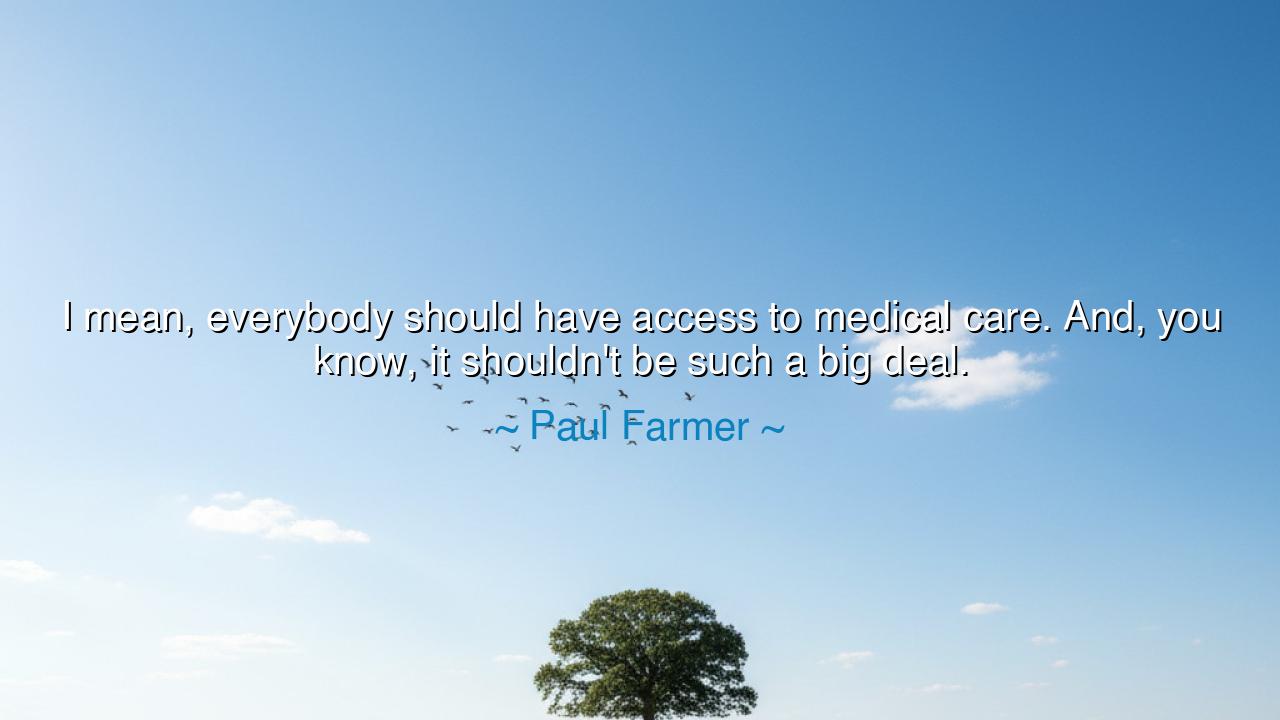
I mean, everybody should have access to medical care. And, you
I mean, everybody should have access to medical care. And, you know, it shouldn't be such a big deal.






"I mean, everybody should have access to medical care. And, you know, it shouldn't be such a big deal." With these simple yet profound words, Paul Farmer encapsulates the essence of human dignity and the moral imperative that healthcare is not a privilege but a fundamental right for every person. In a world often defined by inequities, Farmer calls us to reflect on the basic principle that health—the very foundation of life—should be universally accessible, regardless of one's social or economic status. His words are not just a call for reform but a vision for a world where healthcare is seamless, compassionate, and free from the barriers that currently prevent so many from receiving the care they need.
In the ancient world, medicine was often a privilege of the elite, reserved for kings and the wealthy, while the poor relied on rudimentary treatments passed down through generations of folk healers. Hippocrates, the father of modern medicine, espoused a moral duty for physicians to care for the sick without regard for wealth or status, emphasizing that the healer’s role was to preserve life and alleviate suffering. Yet, even in Hippocrates’ time, there existed a divide between those who had access to skilled care and those who did not. Farmer’s statement resonates with this ancient ethical stance, reminding us that the medical profession is not about exclusivity or distinction but about fulfilling the human need for care and compassion.
As civilizations advanced, particularly during the Roman Empire, medical care became increasingly systematic, yet still, inequalities in access prevailed. The Romans had public baths and rudimentary public health systems, but the finest care was reserved for the elite. The poor, on the other hand, had to rely on rudimentary treatments, often provided by barber-surgeons or herbalists. Farmer’s words call us to remember that in every age, the disparities in medical access reflect a moral failure to acknowledge the universality of human dignity. Just as the Romans had the means to offer care to some but not all, we too must confront the reality that in modern times, the wealthy few often control the systems that could provide for everyone.
Paul Farmer himself exemplifies the call to universal healthcare through his life’s work. As a physician and anthropologist, Farmer dedicated his career to providing healthcare to the impoverished in Haiti, working with Partners In Health to provide life-saving treatments to those in need. His approach was rooted in the belief that healthcare is not simply about treating diseases but about addressing the root causes of poverty, inequity, and injustice. Farmer’s work stands as a living testament to the idea that access to medical care should not be dependent on one’s wealth but on one’s humanity.
Farmer’s words challenge us to see healthcare not as a transaction but as an extension of our moral responsibility toward others. If we look back to ancient cultures like India and China, we see that the practice of medicine was not just a career but a sacred duty. In these societies, healers were regarded with reverence because they tended to the whole person, understanding that health and well-being were intrinsic to life itself. It was not enough to treat an illness; the healer’s role was to restore balance and harmony within the body and the community. Farmer echoes this wisdom, arguing that the true goal of healthcare should not be about profits or prestige but about a universal commitment to each person’s well-being.
The lesson in Farmer’s words is clear: we must reject the notion that healthcare is a privilege for the fortunate few and embrace the idea that health is an inherent right for all people, regardless of their socioeconomic status. Just as Hippocrates taught that the doctor’s role is to provide care for all, so must we ensure that modern systems of medicine are not gatekeepers to life but gateways to justice and equity. Farmer’s lifelong work reminds us that we are all responsible for each other’s health—not just as caregivers but as advocates for change in a system that too often ignores the needs of the most vulnerable.
In our own lives, we must strive to create a world where healthcare is not a commodity but a universal right. Whether we are patients, medical professionals, or citizens, we must demand that the systems that govern healthcare be rooted in compassion, equality, and justice. Let us follow Paul Farmer’s example and work toward a future where access to healthcare is not a privilege determined by wealth, but a right that honors the dignity of every person. Let us push for systems that put the well-being of individuals above the profits of corporations, ensuring that no one is left without the care they deserve, simply because they lack the resources to pay. In doing so, we will honor the ancient wisdom that medicine is not just a practice of science, but a sacred duty to care for one another.






AAdministratorAdministrator
Welcome, honored guests. Please leave a comment, we will respond soon